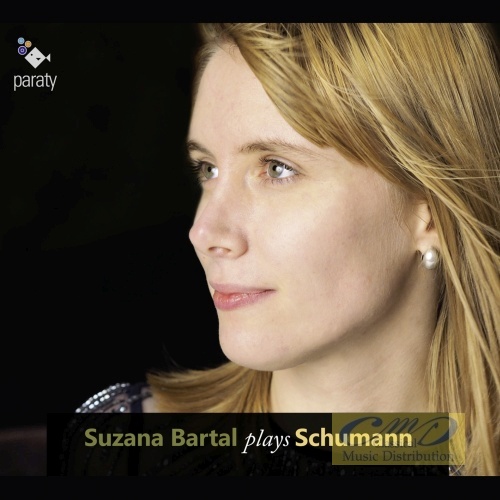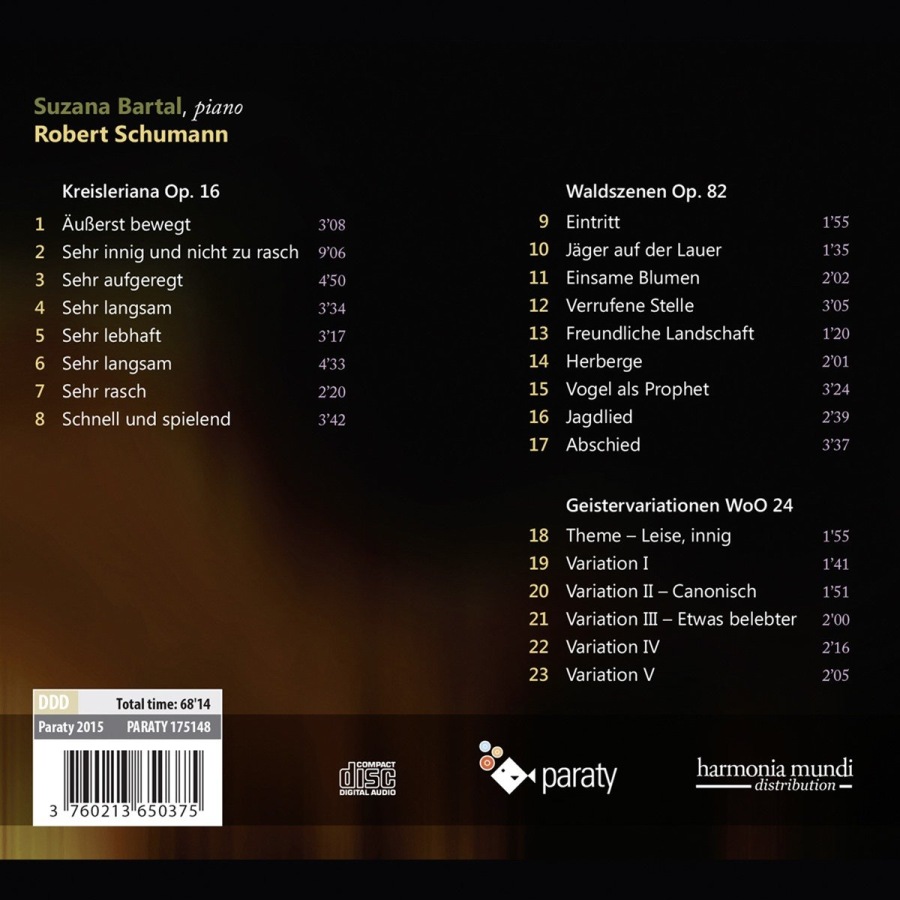
kompozytor
Schumann, Robert
tytuł
Schumann: Piano works
wykonawcy
Bartal, Suzana
nr katalogowy
PTY 175148
opis
"I am another" Kreisleriana op.16: Most of the works that Robert Schumann (1810-1856) composed for the piano are "the paraphrases of poems he did not write". This applies particularly to the “Kreisleriana” op.16 which take their name from Kreisler, the crazy musician invented by the writer E. T. A. Hoffmann (1776-1822). One, Robert Schumann, is a composer who writes. The other, E.T. To Hoffmann, a writer who composes. In order for them to come together artistically, a bridge had to be laid between them, and it was Schumann who built this bridge with the Kreisleriana. The duality, most often conflicting, is at the heart of this work, that of Kreisler with society, Robert with Clara's father, Schumann with Hoffmann, Florestan and Eusébius, Robert with Schumann, anticipating the " I am another "Rimbaldian. "The forest is a state of mind" Scenes from the forest op.82 ": Emblematic figure of German romanticism as was ETA Hoffmann, the painter Caspar David Friedrich died eight years ago when Schumann composed in 1849 the" Scenes of the forest ”. But while listening to this work, it is impossible not to think of his painting "The hunter in the forest" which features a bird in the foreground and, in the distance, a hunter. With all its symbolism of mystery and unconscious, the forest, "which is a state of mind" as the philosopher Gaston Bachelard will so aptly write, is one of the great themes of romanticism and it is not surprising to what Schumann got hold of. "That Obscure Light Falling From the Stars" Variations on the Theme of Spirits WoO 24: Marked with a tragic seal, "Variations of Spirits" is Robert Schumann's latest work for piano. On the night of February 17-18, 1854, he heard angelic voices dictating a theme in E-flat major inspired by Schubert and Mendelssohn. •
He "notes" it a few days later, probably around February 22 or 23. On the 27th, he continued his variation work which he suddenly stopped to leave his home and he threw himself into the Rhine. Saved by the mariners, he is brought home. On March 4, he was interned at his request in Doctor Richarz’s asylum in Endenich, near Bonn, from which he did not leave and where he died two years later. Suzana Bartal is one of the rising talents of the new generation. Born in 1986 in Timisoara (Romania) to a family of Hungarian origin, she began her musical studies in her hometown. She gave her first solo recital at the age of 12 and at 13, her first solo concert with orchestra. She moved to France in 2005 where she studied with Denis Pascal, Pierre Pontier and Florent Boffard in Paris and in Lyon at the National Superior Conservatory of Music and Dance. Between 2011 and 2014 Suzana improved with Peter Frankl at Yale University in the United States where she also taught in 2013 and 2014. She was awarded the Harriet Gibbs Award of Excellence from Yale University. In 2013, Suzana Bartal won the New York Concert Artists Concerto Competition and made her orchestral debut in New York. She also won the Woolsey Concerto Competition, which allowed her to perform with orchestra under the direction of Peter Oundjian. Winner of the prestigious Yamaha Music Foundation of Europe scholarship, Suzana also received support from the Nadia and Lili Boulanger Foundation, ADAMI and the Williamson Foundation.
nośnik
CD
gatunek
Muzyka klasyczna
producent
Paraty
data wydania
29-02-2016
EAN / kod kreskowy
3760213650375

(Produkt nie został jeszcze oceniony)
cena 68,00 zł
lubProdukt dostepny w niewielkiej ilości.
Wysyłka w ciągu 3 dni roboczych
Darmowa wysyłka dla zamówień powyżej 300 zł!
Darmowy kurier dla zamówień powyżej 500 zł!
sprawdź koszty wysyłki





























